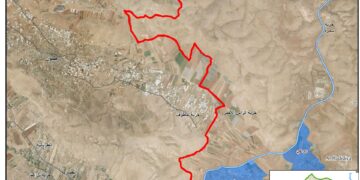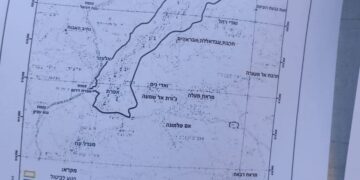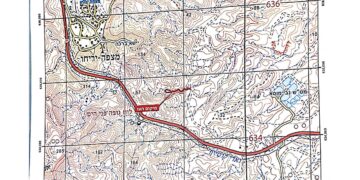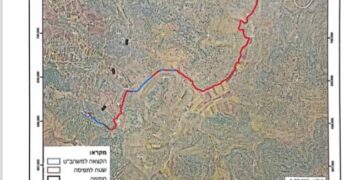- Violation: An order to demolish an agricultural project.
- Date of violation: 08/06/2020.
- Location: Khallet Al-Forn / South Hebron.
- Perpetrators: the so-called Israeli Civil Administration.
- Affected person: citizen Samih Dana.
Violation details:
On June 8, 2020, the Israeli occupation authorities notified the suspension of work and the demolition of an agricultural project owned by Samih Nu’man Shukri Dana, under the pretext of establishing it without a permit, in the “Khalat Al-Forn” area, south of Hebron.
While inspecting the work site, Mr. Dana found a final order to stop work and to demolish what it has been built within 7 days form the date of the issuance of the order which bears number (60640). The order which was issued by the Supreme Organization Council in the so-called Israeli civil administration in the West Bank threatened that if the owner did not get the target project demolished within the period specified in the order, the occupation authorities would carry out the mission and the owner must pay all the cost.
 Picture 1: Copy of the demolition order for Mr. Dana’s project
Picture 1: Copy of the demolition order for Mr. Dana’s project
About a month ago, and on 11/5/2020 the occupation authorities issued a notice to stop work on the agricultural project under the pretext of un-licensing. Then, the owner started legal procedures to object the order but the occupation authorities, as usual, didn’t give him time to continue his mission and issued as final demolition order, and this is exactly what military order number 1979 aims at.
 Picture 2: Copy of notice to stop work on the project
Picture 2: Copy of notice to stop work on the project
The project targeted for demolition is a newly reclaimed piece of land with an area of one dunum cultivated with saplings, vegetables and surrounded with retaining walls and fences. Inside the land there is, also, a 150M2 cave carved into the rock which was recently renovated and prepared as a service room and a place for rest.
Photos 3-5: The threatened renovated cave in Dana’s land
A glimpse Kirbet Khallet Al-Forn:
It is located to the south of Hebron city, and to the southwest of the town of Bani Naim, and it is bordered on the east by a section of road number 317. Khallet Al Forn’s location is exactly opposite the junction leading to the settlement of “Bani Hefer” established on the lands of the town of Bani Naim. The total population of Khallet Al Forn now is about 150 people of mostly Bedouin origin who were expelled from their land in Bir Sheva during the fifties of the last century . They work in agriculture and raising livestock, and depend solar panels for electricity. Ever since its establishment Khallet Al Forn has been under successive Israeli attacks in the form of demolition, confiscation of land and property and movement restrictions.
Military order No. 1797:
The Coordinator of Israeli Government Activities in the Occupied Territories (COGAT) issued military order 1797 on 17 April 2018. COGAT, under the direct control of the Israeli defense ministry, runs civil affairs in the occupied West Bank.
This military order makes it possible for Israeli forces to demolish Palestinian homes deemed as “new” in Area C within 96 hours of a demolition order or removal notice being issued which “blatantly violate international law and contravenes existing local legislation.
According to the military order, “new structures” are those identified by an Israeli ” Civil” Administration (ICA) inspector as having been built within the previous six months, or inhabited for less than 30 days prior to the removal notice. The only way to prevent the demolition is to produce a valid building permit or provide evidence that the targeted structure is not “new” within the meaning of the order.
The new order severely restricts the right to a hearing or the opportunity of appeal. According to the planning regulations applicable in Area C, the first enforcement measure against an unlicensed structure is a stop-work order, which gives the owner 30 days to object and try to obtain a building permit retroactively. If this fails, (COGAT) may issue a final demolition order, usually due for implementation within two to four weeks.
Military Order 1797 allows the Israeli Military Commander to summarily destroy Palestinian structures – including those provided as humanitarian assistance – with virtually no legal recourse available to those whose homes will be destroyed. No access to justice and no protection from grave breaches of IHL.
Military order says Palestinians have 96 hours to appeal house demolition
Even if Palestinians fulfill the appeal requirements put in place by military order 1797, Israeli authorities maintain complete authority to proceed with demolition.
Under the order, COGAT excuses itself from informing Palestinian homeowners directly that their homes are slated for demolition. The Israeli authorities only require demolition orders be placed “next to” relevant structures 96 hours before Israeli forces arrive to execute demolition. If a homeowner does catch wind of an impending demolition, he or she must present an approved master plan and building permit to appeal the demolition. Israel’s discriminatory housing policies in the West Bank ensure that this is an almost impossible requirement for the 300,000 Palestinians living in Area C, 60 percent of the West Bank, to fulfill. For example, between 2010 and 2014, Israel approves 1.5 percent of building applications in Area C. Israeli authorities, however, routinely approve of settlement master plans and even halt demolitions of settler outposts citing the existence of master plans. Indeed, since 2017 Israeli officials have approves nearly 14,000 settlement units in the West Bank.
In addition to having to produce an approved master building plan within four days, Palestinian residents of Area C attempting to forestall demolition must prove that construction on their home or home addition has been completed for six months or that the structure has been inhabited for thirty days.
By requiring that Palestinians produce so many documents in such a short period of time, this military order “virtually strips the affected residents of the right to due process and the capacity to challenge the demolition orders through legal avenues, by requiring that objections to the demolition order be accompanied with a valid building permit. Moreover, COGAT remains the sole arbiter of these appeals. Put differently, even if Palestinians fulfill the appeal requirements put in place by military order 1797, COGAT empowers itself to proceed with demolition anyway.

















